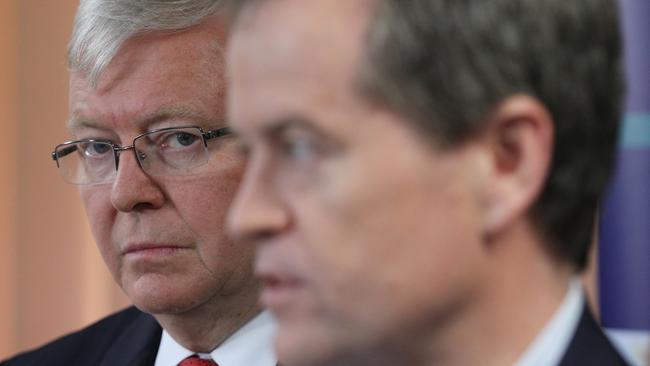
Bill Shorten’s gesture in bestowing Labor life membership on Paul Keating, Kevin Rudd and Julia Gillard underscored his desire to make the party’s 48th national conference a showcase of unity ahead of the next election.
Shorten did so in a “spirit” of unity, gratitude and respect.
Acknowledging the bitterness between Rudd and Gillard, indeed hatred, as they tore each other down in government, Shorten said “there has been a lot of pain”.
This celebration of “healing”, as Shorten called it, was well meant, but it was conducted in an unreal atmosphere where delegates could be forgiven for thinking it was a bizarre alternative universe from an old Star Trek episode.
Has the party forgotten Rudd’s second hefty memoir, The PM Years, published just weeks ago, in which he lashed Shorten and trashed his former colleagues, including Gillard, Wayne Swan, Jim Chalmers, Tony Burke and Jason Clare? And are we meant to forget what they said about him?
Rudd wrote Shorten thought he deserved a more important job than parliamentary secretary for disabilities and children’s services.
“He was hoping for something more,” Rudd wrote.
Burke also, apparently, thought his talents deserved more than the agriculture portfolio. And Clare, who supported Rudd’s return to the prime ministership, was described as having a PhD in “political treachery” because he dared to suggest Rudd should make way for a new leader after losing the 2013 election.
Rudd accused Chalmers of repeatedly crying and begging for preselection in the PM’s office ahead of the 2013 election.
He also took aim at Gillard, who he accused of secretly plotting to bring him down for months, being silent in key cabinet debates and in thrall to the CFMEU.
In her memoir and in interviews, Gillard said Rudd led a chaotic and dysfunctional government, and was not mentally or physically “coping” with the strains of being prime minister. Others, such as Burke, Stephen Conroy and Nicola Roxon, echoed those attacks.
Sitting on the stage was Rudd’s former treasurer Swan, now Labor’s national president. Just months ago, Rudd attacked Swan’s presidential candidature and urged him not to nominate.
In his memoir, Rudd attacked Swan for being “treacherous” and “a coward” for not opposing Gillard’s leadership coup in 2010.
“He didn’t even have the guts to come and front me and tell me face-to-face what he had decided to do,” Rudd wrote.
Rudd said Swan was an “incompetent” treasurer who lacked “a basic level of intellectual software”, did not learn on the job and performed poorly in parliament.
The statement Swan issued after Rudd resigned as foreign minister to launch a leadership challenge against Gillard in 2012 has since passed into Labor lore.
It was drafted by Chalmers, then on his staff, and it didn’t miss: “The party has given Kevin Rudd all the opportunities in the world and he wasted them with his dysfunctional decision-making and his deeply demeaning attitude towards other people, including our caucus colleagues.”
Rudd also found time in his speech to attack John Howard and Malcolm Turnbull and compared Peter Dutton to Lurch from The Addams Family and the corrupt cops of the Bjelke-Petersen era.
Rudd has not followed Gillard’s example of dignity and grace in retirement. The bitterness unleashed by the Rudd-Gillard wars won’t be salved by handing over a medallion. Rudd said it was time to leave it all to “history” to judge — but let’s not have any whitewashing of the past.





To join the conversation, please log in. Don't have an account? Register
Join the conversation, you are commenting as Logout